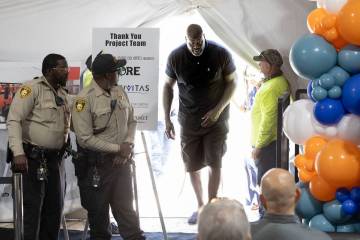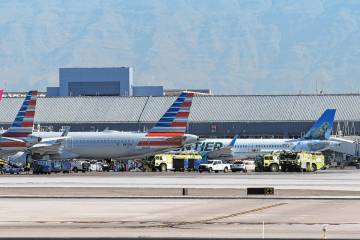Las Vegas police union closes poll mulling strike; statement on next steps to come next week
The Las Vegas Police Protective Association closed a poll on Friday asking its members to consider striking, but gave no indication on whether a work stoppage — which could be considered illegal under state law — will be authorized.
Police union president Steve Grammas told the Las Vegas Review-Journal via text message the poll closed Friday evening and said earlier in the week he had been informed by the Metropolitan Police Department that “we will have expanded negotiations,” but did not elaborate further on the status of talks or whether the union would publicize the poll’s results, which he said still had to be processed.
A statement will be issued next week to members outline next steps, Grammas said.
A spokesperson for Metro did not respond to an inquiry asking to confirm whether new pay negotiations were ongoing.
On June 19, the police union sent a survey and video from Grammas to members that urged them to call on public officials for a raise. The police union is seeking pay adjustments to offset an upcoming increase to the mandatory contribution rate to their deferred compensation retirement plan.
Multiple elected officials on the Clark County Commission and Las Vegas City Council — including members who sit on Metro’s Fiscal Affairs Committee — could not be reached.
Virginia Valentine, a committee member who is also president of the Nevada Resort Association, said the committee only considers labor contracts for possible approval and the committee does not negotiate with the police union.
Clark County spokeswoman Jennifer Cooper described the situation between Metro and the union as “fluid,” while Las Vegas Mayor Shelley Berkley and others on the council deferred to a statement provided to the Review-Journal through a spokesman on June 20. It said Metro and the city were “closely monitoring” the police union’s plans.
The current collective bargaining agreement between Metro and the police union ends June 30, 2026. The union agreed to split PERS increases equally under that labor agreement, city spokesperson David Riggleman said.
“While we understand the union’s frustration with the PERS increase, state law prohibits public safety employees from striking,” Riggleman said in the June 20 emailed statement.
Retirement contributions increasing for Nevada public employees
The union’s poll, according to screenshot of it obtained by the Review-Journal, asked members to vote for one of the following four options: “Commence a strike to start on the 4th of July”; “Exercise your contractual benefit to utilize sick leave starting on the 4th of July”; “Report for duty and refuse to leave the briefing room starting on the 4th of July”; or “Do nothing. Report for duty as normal and take the reduction in pay without a fight.”
The Public Employees’ Retirement System of Nevada in November finalized plans to increase the total employee and employer contribution rate for Nevada police and fire employees to 58.75 percent of gross pay, up from 50 percent, while civilian workers will face a 3.25 percent contribution increase to 36.75 percent. Nevada law states any change in the contribution rate must be shared equally by the employee and employer — meaning Metro and the employee would each contribute 29.375 percent.
The new contribution rate is scheduled to go into effect starting July 19. A pay scale for the 2024-25 fiscal year posted to the union’s website indicates pay rates among police union-backed employees can range from $65,507 to $115,620 annually.Combined with a 2.6 percent cost-of-living increase also set to take effect in July, Grammas claimed Metro employees with the new PERS rate increase would effectively see about a 2 percent decrease to take-home pay over what it is currently.
Public sector strikes illegal in Nevada
Nevada law states the services provided by state and local governments, including policing, are essential, and that strikes against a state or local government employer are illegal.
If a strike occurs or is threatened, the state or local government employer could apply to a court for an injunction to stop a potential strike, defined as any stoppage of work, slowdown, or interruption of operations. Should a strike occur in defiance of a court order, the union representing those employees can be subject to a $50,000 fine, and union leaders can face imprisonment or be fined up to $1,000 per day of continued violation, according to state law.
The law also allows an employee who participates in a strike to face penalties, including dismissal and suspension. Michael Green, a history professor at UNLV, said should a strike proceed, a recent labor dispute between the Clark County School District and the union representing its teachers could offer a glimpse of how the police union’s threat of a strike would turn out.
In 2023, a District Court judge found that an illegal strike had occurred when teachers with the Clark County Education Association engaged in so-called rolling sickouts amid contract negotiations that led to several CCSD campus closures and operational disruptions at others.
“(Police union members) probably would end up not striking, but taking actions like ‘blue flu,’ I could see that happening.” Green said, referring to widespread or rolling sickouts.
Should a strike happen in this case, a judge would almost certainly intervene, Green said. But in any event, support from the public will be critical for the union to achieve its goals, he added.
“Public perceptions of the police, the fire department, it’s a lot like perceptions of lawyers, which is that we often don’t like them until we need them,” Green said. “Even when the police are unpopular, there is a lot of sympathy. And even when the police are popular, there are a lot of questions.”
Contact Casey Harrison at charrison@reviewjournal.com. Follow @Casey_Harrison1 on X or @casey-harrison.bsky.social on Bluesky.


















